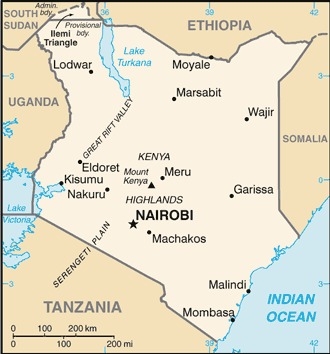Kenya’s government is illegally evicting members of the Ogiek community from their ancestral lands in the Mau Forest, to profit from carbon offsetting schemes, human rights lawyers say.
Members of the Ogiek community say they’re living in “absolute fear” over the evictions by the government of Kenyan President William Ruto.
“We are calling for an immediate cessation of ongoing demolitions and the evictions,” said Cyrus Maweu, deputy director of Kenya National Commission on Human Rights.
“The first day they started bringing down houses using axes, hammers and pangas [machetes],” said Daniel Kobei, executive director of the Ogiek Peoples’ Development Program. “They brought down the school, and on the second day they even started burning some houses. Now they have gone back with heavy machines to bring down houses that were not completely destroyed.”
“We are living in absolute fear,” said Kobei. “They are really bringing down everything.”
Community leaders fear that houses of cultural significance may be destroyed. “This kind of destruction can bring the extinction of a community,” Kobei underscored.

In a case heard by the African Court on Human and Peoples’ Rights, the Ogiek were found to have ancestral rights to the Mau forest and could rightfully occupy it. In 2022, the Ogieks were awarded $1.3 million U.S. dollars to be paid by the Kenyan government for breaching their rights.
Dr. Justin Kenrick from the Forest People’s Program said that carbon credits and offsetting were key to what was happening.
The carbon credit market allows a polluter to emit carbon dioxide or other climate-heating gas and pay a forest owner to capture those emissions through the carbon absorption power of their trees.
Meanwhile, in neighboring Tanzania, the World Bank is said to be financing a project that purports to protect the environment but has been linked to grave human rights violations, according to Rainforest-Rescue, a nonprofit organization. In the latest report by the California-based Oakland Institute, “Unaccountable & Complicit,” the Institute blames the Bank, which is taxpayer-funded, of “enabling” evictions, rapes and murders near the site of a proposed tourism project it is funding.
The $150 million tourism project will protect the environment and attract more tourists to Ruaha national park, the government says.
Villagers living near Ruaha told Oakland Institute researchers that rangers had killed and beaten cattle herders and fishers, had raped women and confiscated thousands of head of cattle, under the premise that they had encroached on the national park.
To expand the park for tourism revenues, the government announced evictions impacting over 20,000 Indigenous and local communities from legally registered villages.
More than 21,000 people from dozens of villages around Ruaha are also facing eviction by the government, it was claimed.
Anuradha Mittal, executive director of the Oakland Institute, said: “[The] Regrow project is not about protecting wildlife or conservation. Instead, the bank is financing an oppressive and violent economic growth model based on boosting tourism revenues.”
“The World Bank should have scrutinized the Tanzanian government’s record on human rights before financing it,” she said, citing the case of Nzigiyimana Zabron v. United Republic of Tanzania Orders (Re-opening). “The government has been criticized for its handling of forced evictions in northern Tanzania, which “should have triggered internal alarm before the bank decided to finance the project,” added Mittal. “Instead, it looked the other way and continues to do so. It should be held accountable.”
The institute said villagers were told in October 2022 they would have to leave their land despite holding title deeds, which the government has canceled, claiming the property fell within the boundaries of the national park.
More than 850 villagers have challenged the evictions in Tanzania’s high court. (GIN)













